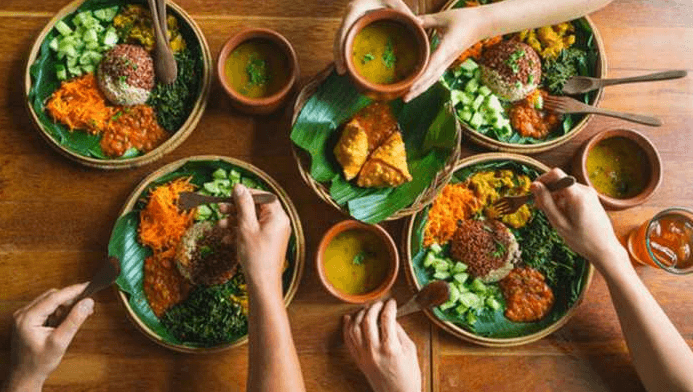wellhealthorganic.com:ayurveda-dinner

Introduction
Ayurveda, the ancient Indian system of medicine, emphasizes the importance of balance in all aspects of life, including diet. An Ayurvedic dinner is more than just a meal; it’s a way to nourish your body, mind, and spirit. By understanding and applying Ayurvedic principles, you can create meals that promote health, digestion, and emotional well-being.
Understanding Ayurveda
What is Ayurveda?
Ayurveda is a holistic healing system that originated in India over 5,000 years ago. It focuses on maintaining health through balance in the body, mind, and environment. The word “Ayurveda” means “science of life” in Sanskrit.
The Three Doshas: Vata, Pitta, and Kapha
Ayurveda is based on the concept of three doshas: Vata, Pitta, and Kapha. These doshas are energies that govern physiological and psychological processes in the body. Each person has a unique combination of these doshas, which influences their health, behavior, and temperament.
The Importance of Balance
The primary goal of Ayurveda is to maintain balance among the doshas. Imbalance can lead to health issues and diseases. Ayurvedic practices, including diet, aim to restore and maintain this balance.
Ayurvedic Diet Principles
The Role of Diet in Ayurveda
Diet is a cornerstone of Ayurvedic medicine. It is believed that the right foods can prevent and treat various health conditions. Ayurveda advocates for a diet that is tailored to an individual’s dosha and current health state.
Principles of Ayurvedic Eating
Ayurvedic eating involves several principles, including eating fresh, seasonal, and locally-sourced foods, incorporating all six tastes (sweet, sour, salty, bitter, pungent, and astringent) into each meal, and eating mindfully.
Seasonal and Dosha-Specific Diets
Ayurvedic diets change with the seasons to keep the body in harmony with the environment. Additionally, diets are customized based on an individual’s dosha to address specific health needs and maintain balance.
Benefits of an Ayurvedic Dinner
Health Benefits
An Ayurvedic dinner offers numerous health benefits, including improved digestion, better nutrient absorption, and enhanced energy levels. These meals are designed to be nourishing and balanced, supporting overall well-being.
Digestive Benefits
Ayurvedic dinners are formulated to support Agni, the digestive fire, which is crucial for efficient digestion and metabolism. Proper digestion helps in maintaining a healthy weight and preventing digestive disorders.
Mental and Emotional Well-being
Eating an Ayurvedic dinner can also promote mental and emotional balance. The right combination of foods can help calm the mind, reduce stress, and improve sleep quality.
Planning an Ayurvedic Dinner
Choosing the Right Foods
When planning an Ayurvedic dinner, it’s essential to select foods that are appropriate for your dosha and the season. Fresh, organic, and whole foods are preferred.
Balancing the Doshas
Each dosha has specific dietary needs. For instance, Vata types benefit from warm, moist, and grounding foods, while Pitta types need cooling, calming foods. Kapha types do well with light, dry, and warming foods.
Meal Timing and Portions
Ayurveda recommends eating dinner early, ideally before 7 PM, to ensure proper digestion. Portions should be moderate to avoid overloading the digestive system at night.
Read Also wellhealthorganic.com/know-the-causes-of-white-hair-and-easy-ways-to-prevent-it-naturally
Common Ingredients in Ayurvedic Dinners
Spices and Herbs
Spices and herbs are integral to Ayurvedic cooking. Commonly used spices include turmeric, cumin, coriander, fennel, and ginger, which have various health benefits and enhance digestion.
Grains and Legumes
Grains like rice, quinoa, and barley, and legumes such as mung beans and lentils are staples in Ayurvedic dinners. They provide essential nutrients and are easy to digest.
Vegetables and Fruits
Fresh, seasonal vegetables and fruits are key components of an Ayurvedic dinner. They should be cooked to enhance digestibility, especially for Vata and Kapha types.
Oils and Ghee
Healthy fats like ghee and sesame oil are favored in Ayurveda for their nourishing properties. They help balance Vata and Pitta doshas and support overall health.
Popular Ayurvedic Dinner Recipes
Kitchari
Kitchari, a mixture of rice and mung dal, is a traditional Ayurvedic dish known for its detoxifying and nourishing properties. It’s easy to digest and balances all three doshas.
Mung Dal Soup
Mung dal soup is a light, protein-rich dish that supports digestion and provides essential nutrients. It’s particularly beneficial for balancing Vata and Pitta doshas.
Spiced Vegetable Curry
A spiced vegetable curry incorporates a variety of vegetables and spices, providing a balanced meal that supports overall health and well-being.
Ayurvedic Teas and Beverages
Ayurvedic teas, such as ginger tea or cumin-coriander-fennel tea, are excellent for aiding digestion and calming the mind after a meal.
Seasonal Ayurvedic Dinner Ideas
Winter Meals
In winter, warming and grounding foods are ideal. Dishes like spiced lentil stews and root vegetable curries help keep the body warm and balanced.
Summer Meals
During summer, cooling and hydrating foods are best. Salads with cooling herbs and light soups can help balance the heat of the Pitta dosha.
Spring Meals
Spring calls for light and cleansing foods. Fresh greens, sprouts, and light soups help detoxify and balance Kapha dosha.
Fall Meals
In fall, warming and nourishing foods are beneficial. Meals with cooked vegetables, whole grains, and warming spices help balance Vata dosha.
Dosha-Specific Dinner Ideas
Vata-Balancing Dinners
For Vata types, grounding and warming foods like stews, cooked grains, and spiced dishes help balance their airy and light nature.
Pitta-Balancing Dinners
Pitta types benefit from cooling and calming foods. Salads, coconut-based curries, and dairy products can help soothe their fiery disposition.
Kapha-Balancing Dinners
Kapha types do well with light, dry, and warming foods. Spiced legumes, steamed vegetables, and low-fat dishes help balance their earthy and watery nature.
Incorporating Ayurveda into Modern Life
Adapting Ayurvedic Principles to Modern Diets
Ayurvedic principles can be adapted to fit modern dietary practices. Incorporating seasonal foods, mindful eating, and balancing the doshas can be integrated into any diet.
Combining Ayurveda with Other Dietary Practices
Ayurveda can complement other dietary practices like vegetarianism, veganism, and gluten-free diets by focusing on balance and nourishment.
Practical Tips for Busy Lifestyles
For those with busy lifestyles, simple Ayurvedic practices like meal planning, batch cooking, and using spices effectively can help maintain balance and health.
Cooking Techniques in Ayurveda
Traditional Cooking Methods
Traditional Ayurvedic cooking methods include slow cooking, steaming, and sautéing, which preserve the nutritional value of foods and enhance digestibility.
Importance of Mindful Cooking
Mindful cooking, which involves preparing meals with attention and care, is a key aspect of Ayurveda. It enhances the energy and nourishment of the food.
Use of Kitchen Tools and Utensils
Using the right kitchen tools, like clay pots and wooden utensils, can enhance the flavor and health benefits of Ayurvedic dishes.
Read Also wellhealthorganic.com:eat your peels: unlocking the nutritional benefits
Enhancing Digestion with Ayurvedic Practices
Importance of Agni (Digestive Fire)
Agni, or digestive fire, is crucial for overall health. Ayurveda emphasizes keeping Agni strong through proper food choices and eating habits.
Pre-Dinner Rituals
Pre-dinner rituals like drinking warm water or herbal teas can stimulate digestion and prepare the body for the meal.
Post-Dinner Routines
Post-dinner routines, such as taking a short walk or practicing gentle yoga, can aid digestion and improve overall well-being.
Ayurvedic Dinner for Specific Health Conditions
Diabetes
For diabetes, Ayurvedic dinners include low-glycemic foods, plenty of vegetables, and spices like turmeric and fenugreek to help regulate blood sugar levels.
Hypertension
To manage hypertension, Ayurvedic meals focus on reducing salt intake, incorporating potassium-rich foods, and using calming spices like garlic and ginger.
Digestive Disorders
For digestive disorders, Ayurveda recommends easily digestible foods like cooked vegetables, rice, and herbal teas to soothe the digestive tract.
Role of Spices in Ayurvedic Cooking
Health Benefits of Common Spices
Spices like turmeric, cumin, coriander, and ginger have anti-inflammatory, digestive, and detoxifying properties that support overall health.
How to Use Spices Effectively
Using spices effectively involves understanding their properties and combining them in ways that enhance the flavor and health benefits of dishes.
Ayurvedic Desserts and Sweets
Healthy Sweet Options
Ayurvedic desserts focus on natural sweeteners like jaggery and honey, and ingredients like nuts and dried fruits that provide nourishment without excessive sugar.
Recipes for Ayurvedic Desserts
Popular Ayurvedic dessert recipes include sweet rice pudding, date and nut laddoos, and spiced fruit compotes, which are both delicious and healthy.
Combining Ayurveda with Yoga
Yoga Poses for Better Digestion
Certain yoga poses, such as twists and forward bends, can stimulate digestion and enhance the benefits of an Ayurvedic dinner.
Evening Yoga Routines
An evening yoga routine that includes gentle stretches and relaxation techniques can help prepare the body for restful sleep and aid digestion.
FAQs
What is the best time to have an Ayurvedic dinner?
Ayurveda recommends eating dinner early, ideally before 7 PM, to ensure proper digestion and restful sleep.
Can Ayurvedic dinners help with weight loss?
Yes, Ayurvedic dinners, which emphasize balanced and nourishing foods, can support weight loss by improving digestion and metabolism.
Are Ayurvedic dinners suitable for vegetarians and vegans?
Absolutely. Ayurvedic principles can be easily adapted to vegetarian and vegan diets, focusing on plant-based foods that balance the doshas.
What are some easy Ayurvedic dinner recipes for beginners?
Simple recipes like kitchari, mung dal soup, and spiced vegetable curry are great for beginners and provide balanced nutrition.
How can I balance my doshas with dinner?
To balance your doshas, choose foods and spices that counteract your dominant dosha’s qualities. For example, if you are predominantly Vata, focus on warm, moist, and grounding foods.
Can I incorporate Ayurveda into my existing diet?
Yes, Ayurveda can be integrated into any diet by following its principles of balance, seasonal eating, and mindful eating practices.
Conclusion
wellhealthorganic.com:ayurveda-dinner offer a holistic approach to nourishment, supporting physical, mental, and emotional well-being. By understanding your dosha and following Ayurvedic dietary principles, you can create meals that promote health and balance. Embrace the wisdom of Ayurveda to enhance your dining experience and improve your overall quality of life.



